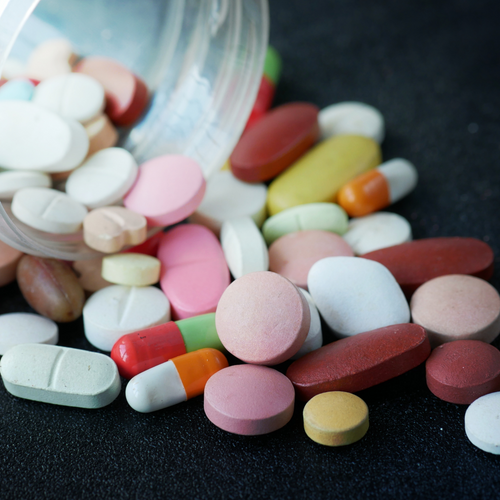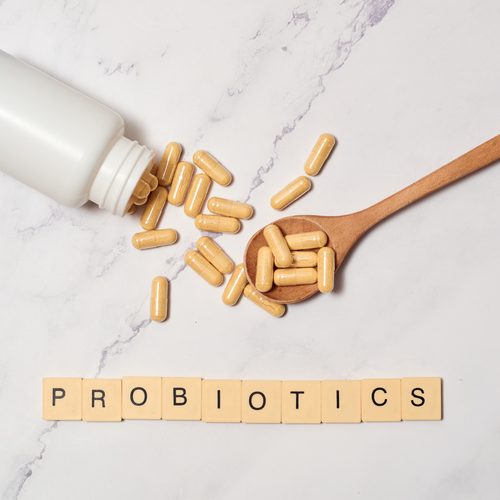What to remember:
Antibiotics act without distinction between pathogenic and beneficial bacteria, which can unbalance the intestinal microbiota.
Even short courses of antibiotic treatment can reduce bacterial diversity and promote digestive disorders or opportunistic infections.
Broad-spectrum antibiotics are most likely to profoundly disrupt the intestinal flora.
Diet (fiber, fermented foods) and a healthy lifestyle (sleep, physical activity, stress management) support the microbiota.
Never take antibiotics without a prescription : reasonable use limits the risks to your microbiota and antibiotic resistance.
Introduction
Our gut is much more than just a digestive organ: it's home to billions of microorganisms—bacteria, yeast, viruses—that form what's called the intestinal microbiota . A true living ecosystem, this microbiota plays an essential role in many of the body's functions: digestion, immunity, vitamin production, inflammation regulation, and even emotional balance.
But this balance is fragile. Among the many factors that can disrupt our microbiota, antibiotics occupy a significant place. Essential in certain medical situations, they act like veritable bulldozers: effective at eliminating pathogenic bacteria, but often to the detriment of our precious good bacteria.
So, what are the real effects of antibiotics on the gut microbiota? How can we protect it or help it rebuild after treatment?
This is what we will see in this article, to better understand the impacts of antibiotics and adopt the right reflexes to support your stomach.
Antibiotics: How do they work?
Antibiotics are drugs designed to destroy or block the growth of bacteria that cause infections. Their discovery marked a major turning point in modern medicine, saving millions of lives since the introduction of penicillin in the 1940s.
Not all antibiotics work in the same way, as there are several classified into different families (penicillins, quinolones, macrolides, etc.). They perform two major actions:
-
Bactericides , which kill bacteria.
-
Bacteriostatics , which inhibit their multiplication, allowing the immune system to do the rest of the work.
Another important distinction is their spectrum of action. Some antibiotics are said to be narrow-spectrum because they target a specific group of bacteria. Others, on the contrary, are broad-spectrum: they act on a much wider range of bacteria, and can cause a profound disruption of the balance of the intestinal microbiota, eliminating beneficial bacteria in the process, leading to dysbiosis . This is what makes their use sometimes problematic.
In other words, if antibiotics are sometimes essential, their non-selective action on bacteria fully justifies thinking about their use and anticipating their effects on our intestinal flora.
A direct impact on the intestinal microbiota
When you take an antibiotic, its goal is clear: to eliminate the bacteria responsible for an infection. But along the way, it fails to differentiate between pathogenic bacteria and those that make up our gut microbiota, which are essential to our health.
Result: taking an antibiotic, especially a broad-spectrum one, causes a rapid and significant alteration in the composition of the microbiota. Several effects have been documented in the scientific literature:
-
A decrease in the diversity of bacterial strains,
-
A reduction of certain beneficial species,
-
An increase in opportunistic (sometimes pathogenic) bacteria.
This shows that even a short course of treatment (7 days) can have lasting effects on the intestinal ecosystem. These imbalances can manifest themselves in different ways depending on the individual:
-
Digestive disorders (diarrhea, impaired transit, gastric disorders),
-
Vaginal infections in women,
-
Overgrowth of yeasts such as Candida albicans ,
-
Allergic reactions,
-
Or, in the most fragile, increased risks of opportunistic infections (such as Clostridioides difficile ).
These observations are not anecdotal: they highlight the vulnerability of the microbiota to antibiotics and the importance of actively protecting or restoring it, especially in the case of repeated or prolonged treatments.
How to limit the effects of antibiotics on the intestinal microbiota? Here are some tips
While antibiotics can be necessary—sometimes lifesaving—it's essential to minimize their impact on our gut microbiota. The good news is that there are simple and effective ways to support it, both during and after treatment.
Supporting the microbiota through diet
Diet remains one of the most powerful levers for maintaining a diverse and resilient microbiota. During and after antibiotic therapy, it is recommended to:
-
Consume fermentable fibers : present in vegetables (leek, onion, artichoke, etc.), fruits (apple, banana), legumes or whole grains, these fibers serve as a substrate for intestinal bacteria, These are called prebiotics.
-
Include fermented foods rich in natural probiotics in your diet (plain yogurt, kombucha , kefir , raw sauerkraut, miso, sourdough bread, lacto-fermented tofu , etc.): they contain live microorganisms capable of temporarily enriching bacterial diversity.
-
Limit ultra-processed foods , rich in fast sugars, poor quality fats and additives, which can disrupt the composition of the microbiota.
Take care of your lifestyle
Other factors influence the ability of the microbiota to recover:
-
Sleep : Restorative sleep supports the regulation of the immune system and metabolism, while promoting the body's overall recovery, which is particularly important during treatment.
-
Chronic stress can disrupt communication between the brain and gut (gut-brain axis) and influence the composition of the microbiota.
-
Regular physical activity , even moderate, is associated with greater bacterial diversity.
Follow medical instructions
Finally, it is essential to never take antibiotics without a prescription. Their inappropriate use contributes to antibiotic resistance—a major public health issue—and unnecessarily increases the risk of microbiota imbalance.
In conclusion
Antibiotics have revolutionized modern medicine and remain, in many cases, absolutely essential. But their effectiveness comes with side effects, particularly on our gut microbiota, a key player in our overall health.
While they shouldn't be demonized, it's important to be aware of their impact in order to better anticipate it. By adopting simple habits—an appropriate diet, a healthy lifestyle, and responsible use—we can support our microbiota and help our gut regain a better balance after treatment.
Better understanding the interactions between antibiotics and microbiota also means laying the foundations for more sustainable... and more conscious digestive health.
Sources :
[1] Inserm, 2021, Intestinal microbiota (intestinal flora) - A serious avenue for understanding the origin of many diseases, consulted from: https://www.inserm.fr/dossier/microbiote-intestinal-flore-intestinale/#comprendre-le-r%C3%B4le-du-microbiote-intestinal
[2] Health Insurance, 2025, Using antibiotics against bacteria, consulted from: https://www.ameli.fr/assure/sante/medicaments/utiliser-recycler-medicaments/utiliser-biotiques#:~:text=Les%20biotiques%20sont%20des%20m%C3%A9dicaments,quinolones%2C%20macrolides%2C%20etc .)
[3] Francisco Guarner, 2020, Impact of antibiotics on the intestinal microbiota: how important is it?, consulted from: https://www.biocodexmicrobiotainstitute.com/fr/pro/impact-des-biotiques-sur-le-microbiote-intestinal-quelle-importance#:~:text=Antibiotics%20et%20risque%20de%20maladies,-Des%20perturbations%20de&text=Le%20fait%20quune%20exposition,la%20pathogen%C3%A8se%20des%20troubles%20chimiques%20inflammatoires .
[4] Panda, S., El khader, I., Casellas, F., López Vivancos, J., García Cors, M., Santiago, A., Cuenca, S., Guarner, F., & Manichanh, C. (2014). Short-term effect of antibiotics on human gut microbiota. PloS one, 9(4), e95476. https://doi.org/10.1371/journal.pone.0095476
[5] Brian J. Werth, 2024, Overview of Antibiotics, accessed from: https://www.msdmanuals.com/fr/accueil/infections/biotiques/pr%C3%A9sentation-des-biotiques















